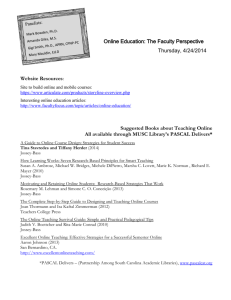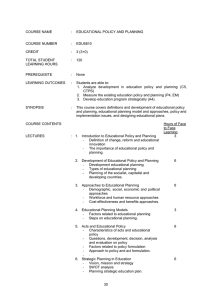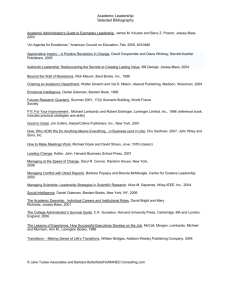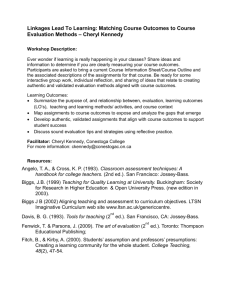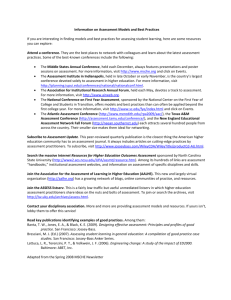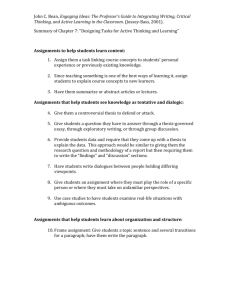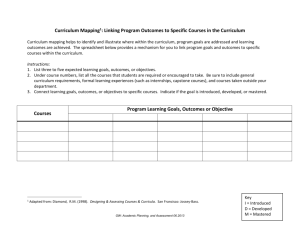PADM 7336 * Introduction to Nonprofit Management
advertisement
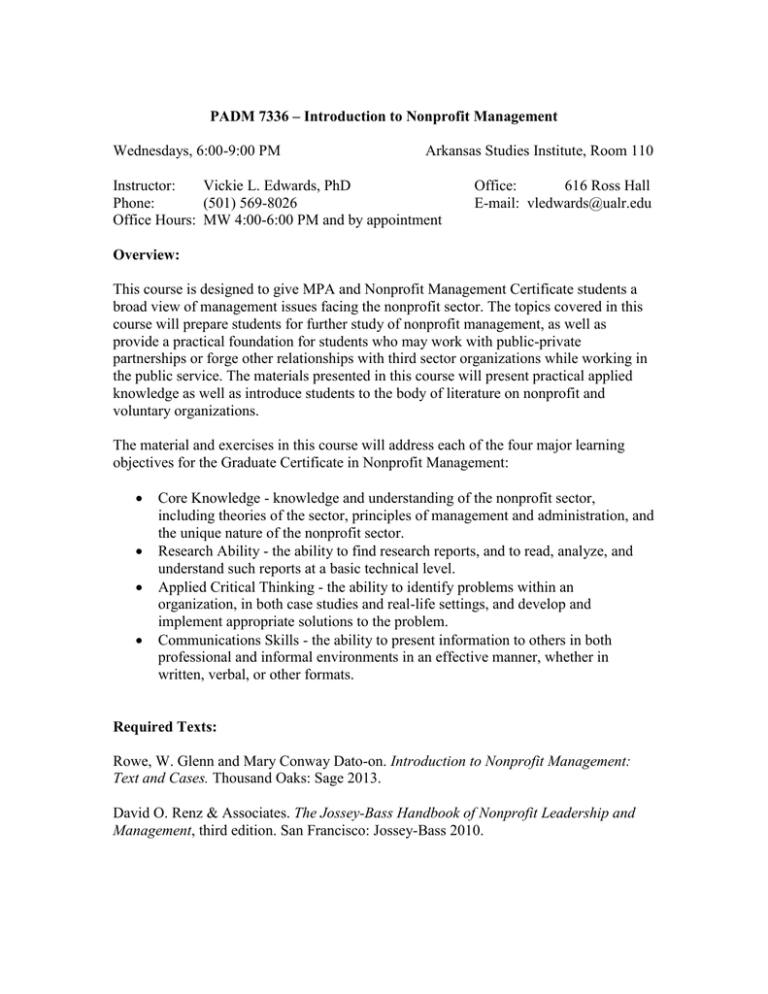
PADM 7336 – Introduction to Nonprofit Management Wednesdays, 6:00-9:00 PM Arkansas Studies Institute, Room 110 Instructor: Vickie L. Edwards, PhD Phone: (501) 569-8026 Office Hours: MW 4:00-6:00 PM and by appointment Office: 616 Ross Hall E-mail: vledwards@ualr.edu Overview: This course is designed to give MPA and Nonprofit Management Certificate students a broad view of management issues facing the nonprofit sector. The topics covered in this course will prepare students for further study of nonprofit management, as well as provide a practical foundation for students who may work with public-private partnerships or forge other relationships with third sector organizations while working in the public service. The materials presented in this course will present practical applied knowledge as well as introduce students to the body of literature on nonprofit and voluntary organizations. The material and exercises in this course will address each of the four major learning objectives for the Graduate Certificate in Nonprofit Management: Core Knowledge - knowledge and understanding of the nonprofit sector, including theories of the sector, principles of management and administration, and the unique nature of the nonprofit sector. Research Ability - the ability to find research reports, and to read, analyze, and understand such reports at a basic technical level. Applied Critical Thinking - the ability to identify problems within an organization, in both case studies and real-life settings, and develop and implement appropriate solutions to the problem. Communications Skills - the ability to present information to others in both professional and informal environments in an effective manner, whether in written, verbal, or other formats. Required Texts: Rowe, W. Glenn and Mary Conway Dato-on. Introduction to Nonprofit Management: Text and Cases. Thousand Oaks: Sage 2013. David O. Renz & Associates. The Jossey-Bass Handbook of Nonprofit Leadership and Management, third edition. San Francisco: Jossey-Bass 2010. Course Requirements and Evaluation: Assignments Final Paper and Presentation Course Participation 50% (10% each) 30% 20% Please note that all assignments and papers should be submitted on paper and on time. No assignments will be accepted via e-mail, disc, or other electronic format, and no late assignments will be accepted. Assignments: Assignments will involve examining case studies used in the text, and will require students to critically analyze each case study in the context of theories and concepts discussed in class. Each assignment will cover at least two case studies, and student responses should be no less than four pages in length using a double-spaced, 12point font with 1” margins. Literature Review and Presentation: Each student will prepare a thorough literature review, approximately 10-12 pages of text in length (using a double-spaced, 12-point font with 1” margins) in addition to a works cited page and abstract, on a topic related to the themes covered in this course. This topic, and a preliminary list of eight potential sources, must be approved by the instructor no later than September 25. More detailed instructions will be provided in class, including techniques for finding relevant scholarly literature and how to properly organize such papers. Students will present their findings in a 5-7 minute presentation to the class at the end of the semester. Course Participation: Student participation is arguably the most valuable component of this course. Students should attend class prepared to discuss the readings and engage in conversations about the subject matter. It is important to note that students will not automatically receive a full grade for simply showing up to class or asking an occasional question. Rather, students are expected to earn their participation grade by acquainting themselves with the course material ahead of time and discussing it with the instructor and other students. Course Schedule: Please note that the dates for each topic are tentative. Some topics will require greater discussion and more time than others. Students are expected to attend all class sessions and to be prepared for the next topic by completing readings ahead of time. In the event of significant schedule changes, students will be notified of the changes both in class and by the distribution of a new schedule. Date August 21 August 28 Topic Introduction and Overview Skill Perception Survey Starting a Nonprofit and Readings Chapter 1, Jossey-Bass Chapter 1 Chapter 2, Jossey-Bass September 4 Compliance Issues Nonprofit Governance Assignment 1 Due – September 11, 2013 September 11 Leadership September 18 Performance Management Chapter 2 Chapter 3, Jossey-Bass Chapter 5 Chapter 4, Jossey-Bass Chapter 6 Chapter 5, Jossey-Bass Chapter 16 Assignment 2 Due – September 25, 2013 Deadline for Approved Literature Review Topic and Sources September 25 Strategic Management Chapter 6, Jossey-Bass Chapter 8 October 2 Organizational Capacity and Chapter 7, Jossey-Bass Networks Chapter 14 October 9 Human Resource and Chapter 8, Jossey-Bass Volunteer Management Chapter 26 Assignment 3 Due – October 16, 2013 October 16 Marketing Strategies Chapter 9, Jossey-Bass Chapter 11 October 23 Fundraising Strategies Chapter 10, Jossey-Bass Chapter 19 Assignment 4 Due – October 30, 2013 October 30 Financial Management Chapter 11, Jossey-Bass Chapter 17 November 6 Advocacy and Lobbying Chapter 12, Jossey-Bass Chapter 13 November 13 Nonprofits in a Global Context Chapter 13 Assignment 5 Due – November 22, 2013 November 22 Social Entrepreneurship Chapter 14, Jossey-Bass Chapter 10 Final Paper Presentations – December 4, 2012 Students with Disabilities: Your success in this class is important to me, and it is the policy and practice of the University of Arkansas at Little Rock to create inclusive learning environments consistent with federal and state law. If you have a documented disability (or need to have a disability documented), and need an accommodation, please contact me privately as soon as possible, so that we can discuss with the Disability Resource Center (DRC) how to meet your specific needs and the requirements of the course. The DRC offers resources and coordinates reasonable accommodations for students with disabilities. Reasonable accommodations are established through an interactive process among you, your instructor(s) and the DRC. Thus, if you have a disability, please contact me and/or the DRC, at 501569-3143 (V/TTY) or 501-683-7629 (VP). For more information, please visit the DRC website at ualr.edu/disability. Academic Integrity: According to UALR policy, the following actions are subject to grade penalty and disciplinary action: Cheating on an examination or quiz: To give or receive, to offer or solicit information on any quiz or examination. This includes the following classes of dishonesty: (a) copying from another student’s paper; (b) use during the examination of prepared materials, notes or text other than those specifically permitted by the professor: (c) collaboration with another student during the examination; (d) buying, selling, stealing, soliciting, or transmitting an examination or any material purported to be the unreleased content of a coming examination, or the use of such material; (3) substituting for another person during an examination or allowing such substitution for oneself; (f) bribery of any person to obtain examination information. Plagiarism: To adopt and reproduce as one’s own, to appropriate to one’s own use and incorporate in one’s own work without acknowledgement, the ideas of others or passages from their writings and works. Collusion: To obtain from another party, without specific approval in advance by the professor, assistance in the production of work offered for credit to the extent that the work reflects the ideas or skills of the party consulted rather than those of the person in whose name the work is submitted. Duplicity: To offer for credit identical or substantially unchanged work in two or more courses, without specific advance approval of the professors involved.
